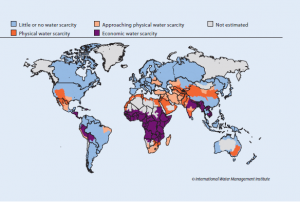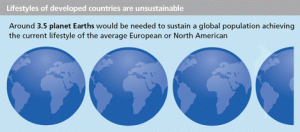Cooperation in the Face of Water Scarcity and Population Growth
Sep 6th, 2013 | By admin | Category: Water IssuesBy Suzanne York, www.howmany.org
In this summer of drought in many places around the world, concern about water is growing. Coping with water scarcity is a main topic at World Water Week, which is currently winding down in Stockholm, Sweden. This is an annual gathering of leaders, experts, and perhaps a few activists to discuss the challenges of building partnerships to cope with water shortages.This year’s theme is “Water Cooperation: Building Partnerships.” With increasing climate change and potential of resource shortages – not to mention population growth – water issues are ignored at our own peril and greater cooperation will be needed everywhere.
Some 1.2 billion people around the world live under conditions of water scarcity. According to the United Nations, it is estimated that by 2025 1.8 billion people will in countries or regions with absolute water scarcity, with almost half of the world living in conditions of water stress.
The UN Food and Agriculture Organization (FAO) stated that global water use has been growing at more than twice the rate of population increase in the last century. The most recent UN population projections are for 9.6 billion people by 2050.
A few more water and population statistics to keep in mind include:
- By 2050, global water demand is expected to increase by 55 percent, due to growing demands from manufacturing, electricity generation and households;
- As the Middle East and North Africa region’s population continues to grow, per capita water availability is set to fall by 50 percent by 2050, and, if climate change affects weather and precipitation patterns as predicted, the region may see more frequent and severe droughts and floods (water is a factor in the current conflict in Syria);
- 2.6 billion people, a third of the world’s population, are still without access to improved sanitation;
- An estimated 90 percent of the people expected to be added to the population by 2050 will be in developing countries, many in regions already in water stress where the current population does not have sustainable access to safe drinking water and adequate sanitation.
Population growth, often an ignored issue, was addressed by UN Deputy Secretary-General Jan Eliasson, who said “In a world of population growth and pressures on water resources within and among nations, sound and fair water management is a huge task and a clear imperative for all of us.”
As often happens with big international conferences, corporations are seen as the answer to any problems, and there is a lot of greenwashing that takes place. The conference packet even noted that “So whether we like it or not, clean water comes at a price.” Business can play a role, but water is a common good and human right and is not a service on which corporations should put a price tag. What the world needs are solutions that directly empower people – especially women – to better their lives and environment.
For example, in India, communities in the desert state of Rajasthan are using taankas, or underground water storage tanks; this was a traditional way of harvesting and storing rainwater. In Africa, the Global Women’s Water Initiative works in 13 nations to improve water supply through training African women leaders as water and sanitation technicians. The trainings empower African women leaders with water technologies, livelihood opportunities, seed funding, and leadership skills so they can design appropriate and long-term solutions to water and sanitation crises in their communities.
And also critical are public and private initiatives that promote efficiency and conservation, especially in the agricultural sector, which uses 70% of global water withdrawals for irrigation, much of it inefficient.
Encouragingly, there seems to be an understanding that nature must be respected. “The big elephant in the room is that we don’t have a partnership with nature,” said Yolanda Kakabadse, President of the World Wide Fund for Nature. “If we don’t accept that water secures life, then we have nothing to talk about. Water does not come from the tap, it comes from nature.” If there is to be cooperation, it should start with this most precious of resources provided by nature and extend out from there to people and communities across the globe.
Suzanne York is a senior writer with the Institute for Population Studies.



